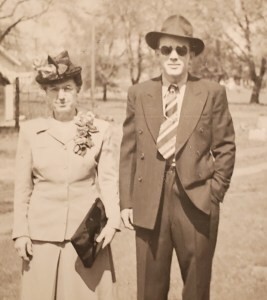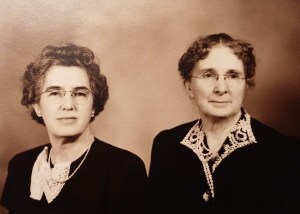That Missing Year: 1947
Recently I read Jerry Sittzer’s book A Grace Disguised, about the aftermath–physically, emotionally, mentally, and spiritually–of suddenly losing three family members.
What agony did Grandma Leora go through, I pondered, after losing three sons and being widowed within a three-year period? Since I was a toddler during that time, I didn’t experience the days of her deepest grief. She cried only once at the cemetery, when we took flowers for Decoration Day when I was a child. Her daughters didn’t gather around her, which would have meant tears for all three. I imagine there were plenty when grandchildren weren’t with them.
There are no family letters after Grandpa Clabe’s death in late 1946, and Grandma hadn’t yet started keeping a diary. She wrote in her memoir, “I have all their letters we received and, to this day in 1980, cannot read their letters. I don’t know if I ever can, as it opens that awful feeling of grief.”
After Junior Wilson was killed in August of 1945, Clabe and Leora’s oldest son Delbert, his wife, and toddler daughter moved in with them at the Perry acreage. Another baby daughter had been born that fall, so the little house was full when Clabe died in October of 1946.
Leora’s mother, Laura Goff, had been living with her youngest son in Omaha since 1935. Leora must have also stayed with them part of the time, giving mother and daughter precious time together in that missing year, 1947.
 1947, leaving for Omaha, Leora and son Donald Wilson. She’s wearing a corsage. Might this have been Mother’s Day?
1947, leaving for Omaha, Leora and son Donald Wilson. She’s wearing a corsage. Might this have been Mother’s Day?Laura had been through tragedies of her own. As a child, she lost her next three siblings as children, leaving an eight-year emptiness in her life and that of her parents. Did Laura talk about that? Had her family found solace in their faith?
About losing a teacher friend to drowning? Consoling cousins who lost three children to cholera in one week?
When the Goffs lived in Minnesota, Laura bought a Bible, which she embraced while three sons served in World War I. She’d also read it twice since she moved to Omaha. Laura probably shared verses with her daughter that brought comfort to them both.
When the Goffs lived in Guthrie Center during the 1920s, Leora’s closest sister Georgia died, age 28. Two years later, the Goffs lost a daughter-in-law. They were the first two buried in the Goff plot in Guthrie Center. Devastating losses.
The Goffs lived near the Leora’s family in Dexter when they lost baby twins to whooping cough, and also Leora’s last infant. Laura made burial gowns for them. Her own last baby had died as well, buried at Audubon but also remembered in the Guthrie Center cemetery, where Sherd Goff was buried as well as Leora’s three infants.
Both mother and daughter were widowed, both had lost their homes. Both were born in Guthrie County, grew up there, with cousins still in the area. Both had loved ones buried in Guthrie Center.
They decided to return to their roots, where Laura had attended the Christian Church and was already a member of the Rebekahs. Clarence, the youngest Goff, who was a Guthrie Center graduate, worked with a builder in there. This would be their first house someone else had not lived in before, with electricity and running water and a real bathroom.
The Guthrie Center house was well underway when Leora was asked to complete a Request for Disposition of Remains for Lt. Daniel S. Wilson in October 1947. After talking over the decision with her four surviving children, they decided they just couldn’t face another funeral. And what about Dale? He would probably never be found. A month later Leora mailed the notarized form to request his permanent burial in an American Military Cemetery overseas.
In December, Delbert’s wife Evelyn wrote Leora who was still in Omaha, “Spats has gone.” This is the last mention of the Wilsons’ beloved pet.
 Leora Wilson and her mother, Laura Goff, taken in Omaha shortly before the moved into their new little home in Guthrie Center.
Leora Wilson and her mother, Laura Goff, taken in Omaha shortly before the moved into their new little home in Guthrie Center.The missing year, 1947. Bittersweet. Even living with deep sorrow and unthinkable losses, Leora and her mother were blessed with the comfort of each other’s company in a brand new little home of their own, with space to plant a weeping willow in the back yard, and ferns in a widow box to greet them each morning.



